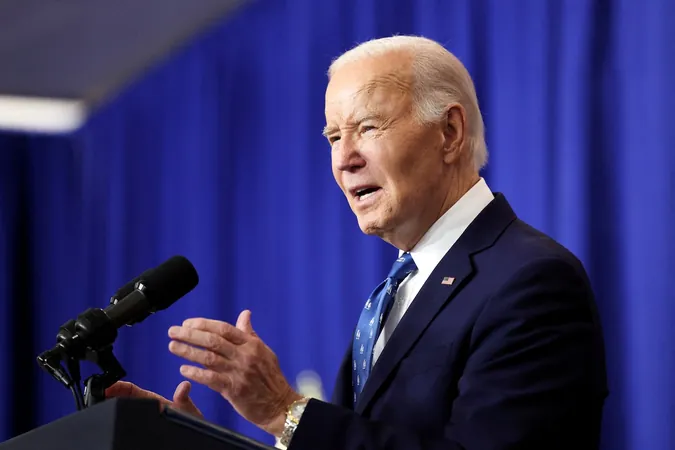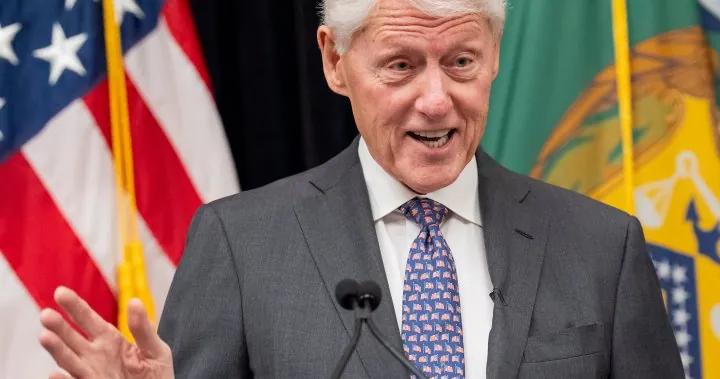
Historic Move: Biden Commutes Death Sentences of 37 Inmates Just Before Trump Takes Office
2024-12-23
Author: Emma
Historic Move: Biden Commutes Death Sentences of 37 Inmates Just Before Trump Takes Office
In a significant and controversial decision, President Joe Biden announced on Monday that he would commute the death sentences of 37 out of the 40 inmates currently on federal death row, transitioning their punishments to life imprisonment without the possibility of parole. This bold action comes mere weeks before President-elect Donald Trump, a vocal supporter of capital punishment, assumes office.
This decision protects the lives of individuals convicted of heinous crimes, including the murders of law enforcement personnel and military officers, crimes committed on federal property, as well as those involved in violent bank heists and drug-related killings. Notably, only three inmates will still face the death penalty: Dylann Roof, convicted for the racially charged massacre of nine Black churchgoers in South Carolina in 2015; Dzhokhar Tsarnaev, one of the individuals responsible for the 2013 Boston Marathon bombing; and Robert Bowers, the perpetrator of the 2018 synagogue shooting in Pittsburgh that claimed the lives of 11 individuals in the deadliest antisemitic attack in U.S. history.
In a statement, President Biden expressed his commitment to reforming the justice system: “I’ve dedicated my career to reducing violent crime and ensuring a fair and effective justice system. Today, I am commuting the sentences of 37 of the 40 individuals on federal death row to life sentences without the possibility of parole.” He emphasized that this move aligns with the moratorium that his administration enacted on federal executions, which currently excludes cases related to terrorism and hate-fueled mass murders.
The Biden administration had previously announced a halt to federal capital punishment in 2021 to review existing protocols, effectively pausing executions throughout Biden's presidency. However, Biden's long-standing position has been to abolish the death penalty at the federal level entirely, a promise made during his 2020 presidential campaign.
While campaigning, Biden's platform included plans to incentivize states to eliminate the death penalty, yet similar statements were absent from his reelection efforts before he suspended his campaign earlier this year.
In what appeared to be a direct critique of Trump's forthcoming administration, Biden stated: “In good conscience, I cannot stand back and let a new administration resume executions that I halted.” Trump has famously advocated for expanding capital punishment, particularly for those he believes are involved in drug trafficking and violent crimes. His past presidency witnessed a record 13 federal executions—the highest number in modern history.
Advocacy groups have recently pressured Biden to act swiftly, aware that Trump may push for an increase in capital punishment once he takes office. This announcement also comes shortly after Biden's commutation of approximately 1,500 nonviolent offenders released during the COVID-19 pandemic, marking one of the largest acts of clemency in modern American history.
Moreover, Biden's recent pardon of his son, Hunter, for federal gun and tax offenses has stirred debate, leading to speculation about potential future pardons that may protect other administration allies against what they fear could be Trump’s retribution.
Biden’s upcoming visit to Italy, coinciding with this announcement, underscores his efforts to address the moral implications of capital punishment. As a devout Catholic, he plans to meet with Pope Francis, who recently called for prayers to vouchsafe the lives of death row inmates and advocate for clemency in their cases.
Prominent civil rights advocate Martin Luther King III praised Biden's decision, highlighting that it addresses the racial inequalities embedded within the death penalty. Retired Ohio police officer Donnie Oliverio, whose former partner was killed by one of the inmates granted clemency, shared a poignant sentiment, stating that executing the individual would not bring him solace. “The president has done what is right here…and what is consistent with the faith he and I share,” Oliverio remarked.
This unprecedented action by President Biden not only marks a potential turning point in U.S. capital punishment policy but also raises important questions about justice, morality, and the future of federal executions under the changing political tide. Will this bold stance set a precedent for a new chapter in the justice system, or will the incoming administration reverse these changes? Stay tuned as this story continues to unfold.









 Brasil (PT)
Brasil (PT)
 Canada (EN)
Canada (EN)
 Chile (ES)
Chile (ES)
 España (ES)
España (ES)
 France (FR)
France (FR)
 Hong Kong (EN)
Hong Kong (EN)
 Italia (IT)
Italia (IT)
 日本 (JA)
日本 (JA)
 Magyarország (HU)
Magyarország (HU)
 Norge (NO)
Norge (NO)
 Polska (PL)
Polska (PL)
 Schweiz (DE)
Schweiz (DE)
 Singapore (EN)
Singapore (EN)
 Sverige (SV)
Sverige (SV)
 Suomi (FI)
Suomi (FI)
 Türkiye (TR)
Türkiye (TR)